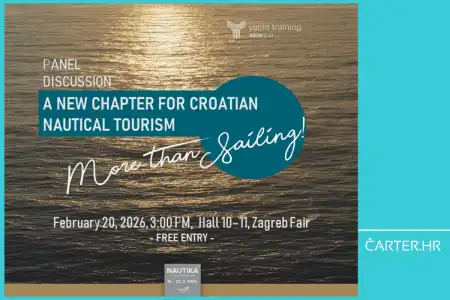
- 31.10.2023.
- News, Regulations
Let’s look at the legal aspects, benefits and challenges of introducing 'green' technologies on charter vessels. Learn how these changes reduce environmental impact and offer potential benefits such as emission reduction, cost savings and a better image. Katarina Ćosić brings us information on how to achieve a balance between economic sustainability and environmental responsibility in the yacht charter industry, and much more.
Charter boats are a popular choice for travelling and vacationing at sea. Still, growing concerns about the impact of maritime transport on the environment are leading to the need to implement "green" technologies on these vessels.
This article explores the legal aspects accompanying the application of "green" technologies on charter vessels, focusing on the regulatory framework, potential benefits and emerging challenges.
Regulatory frameworks
Implementing "green" technologies on charter vessels is subject to different regulations that vary from country to country.
The International Maritime Organization (IMO) sets global standards for navigation safety and environmental protection, including the emission of harmful gases and the reduction of marine pollution. In addition, many countries have standards and laws related to "green" initiatives.
Implementing "green" technologies on charter vessels is subject to international and national laws related to environmental protection.
In particular, the MARPOL Convention (Convention for the Prevention of Marine Pollution from Ships) contains provisions related to greenhouse gas emissions and marine pollution. It applies to all vessels sailing in international waters.
MARPOL is an international treaty whose goal is to completely eliminate the intentional or accidental pollution of the marine environment by vessels, all harmful substances to people and other living beings, and the use of the sea.
The European Union has a marine environmental directive that applies to all vessels sailing in European waters and contains provisions related to greenhouse gas emissions and marine pollution.
In addition, some initiatives promote "green" technologies in the maritime sector, such as the "Green Navigation" project of the European Maritime Safety Agency (EMSA).
The mentioned regulations are only some of the many legal regulations that refer to this topic. Implementing "green" technologies for charter vessels is an important topic that has a significant impact on the environment, and compliance with legal regulations is vital to maintaining the environment and preventing pollution.

Legal aspects of the implementation of "green" technologies in charter vessels
Implementing green technologies in charter vessels is subject to various legal aspects to ensure compliance with maritime, environmental and safety regulations.
Several key legal aspects should be considered:
Maritime Laws and Regulations: Maritime laws regulate all aspects of safety at sea, including technical specifications and vessel requirements. When implementing green technologies, charter vessels must comply with relevant maritime laws and regulations, including safety standards and technical specifications.
Environmental laws: Environmental protection is an important aspect when it comes to the implementation of green technologies. States have laws and regulations that limit emissions of harmful substances, monitor and reduce marine pollution, and other aspects of environmental protection. Charter vessels must comply with these laws to minimize negative impacts on the environment.
Safety of Navigation: The implementation of green technologies can affect the safety of navigation. All changes on board, such as new technologies to reduce emissions, must be tested and certified to ensure they do not compromise the safety of passengers, crew and navigation.
Certification and Approvals: Vessels must obtain appropriate certificates and approvals to demonstrate compliance with relevant laws and standards, depending on the type of green technologies being implemented.
Maintenance and Monitoring: After implementing green technologies, charter boats must regularly maintain and monitor these systems to ensure their effectiveness and safety. Proper maintenance may also be regulated by law.
Incentives and Subsidies: States and regions can offer incentives and subsidies for charter boat owners who invest in green technologies. The legal aspects of these grants are also important, as vessel owners need to know how to obtain and use them.
International Aspects: If charter vessels travel outside their country's territorial waters, they may encounter international legal issues, including international maritime and environmental conventions and agreements.

Potential benefit of "green" technologies for charter vessels
a) Reduction of emissions: One of the key benefits of "green" technologies on charter vessels is the reduction of emissions of harmful gases such as sulfur dioxide (SO2) and nitrogen oxides (NOx). This is especially important in regions with stricter emissions regulations, as it can help yacht charter companies comply with the law and reduce their environmental footprint.
b) Reduction of fuel costs: Using technologies such as energy-efficient engines and renewable energy sources can reduce fuel costs for charter vessels. This can increase business profitability, especially in conditions of rising oil prices.
c) Better image: Yacht charter companies that apply "green" technologies can create a better image in the eyes of consumers. Eco-conscious travellers are increasingly choosing sustainable options, which can lead to greater demand for charter vessels that adhere to environmental standards.
Challenges in the implementation of "green" technologies
a) Costs: The initial costs of implementing "green" technologies, such as solar panels, wind generators or fuel cells, can be high. However, in the long run, these costs often pay off through fuel savings and a better image.
b) Technical aspects: Sometimes, considerable modification of charter vessels is required to integrate "green" technologies, which may require specialized technical knowledge and skills.
c) Legal issues: Implementing new technologies can cause legal issues, including regulations around security and certification. Also, yacht charter companies should be careful about compliance with local and international regulations on environmental protection.

Conclusion
Implementing "green" technologies on charter vessels is an important initiative to reduce the negative impact of maritime transport on the environment.
Although there are challenges, the potential benefits, including reduced emissions, reduced fuel costs and improved image, make this step worthwhile.
Legal aspects are key in ensuring regulatory compliance and achieving sustainability goals in the maritime industry. Through cooperation between yacht charter companies, authorities and relevant agencies, it is possible to achieve a balance between economic sustainability and environmental responsibility in the yacht charter sector.
Categories of trends
- News
- Sale
- Marketing
- SEO
- Web design
- Social media
- Technology
- Regulations
- Management
- Education
- Finances
- User experience
Newsletter
Sign up for the newsletter and receive the latest trends and tips straight to your inbox




